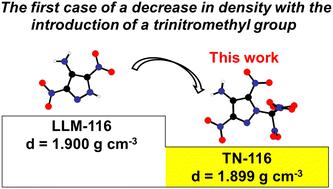当前位置:
X-MOL 学术
›
Chem. Commun.
›
论文详情
Our official English website, www.x-mol.net, welcomes your
feedback! (Note: you will need to create a separate account there.)
Can a heavy trinitromethyl group always result in a higher density?
Chemical Communications ( IF 4.3 ) Pub Date : 2023-01-20 , DOI: 10.1039/d2cc07077d Ning Ding 1 , Qi Sun 1 , Xudong Xu 1 , Yaqiong Li 1, 2 , Chaofeng Zhao 1 , Shenghua Li 1, 2 , Siping Pang 1
Chemical Communications ( IF 4.3 ) Pub Date : 2023-01-20 , DOI: 10.1039/d2cc07077d Ning Ding 1 , Qi Sun 1 , Xudong Xu 1 , Yaqiong Li 1, 2 , Chaofeng Zhao 1 , Shenghua Li 1, 2 , Siping Pang 1
Affiliation

|
Density is an important property of energetic materials and is believed to increase with the addition of heavy trinitromethyl groups, as shown in previous literature. However, this study determined that the introduction of these groups produced a decrease in density, as evidenced by the lower density of 1-trinitromethyl-4-amino-3,5-dinitropyrazole ((TN-116), 1.899 g cm−3) compared to that of its precursor (4-amino-3,5-dinitropyrazole (LLM-116), 1.900 g cm−3). Mechanistic studies indicated that the reduced density was due to the significantly weaker H-bonding and π–π interactions of TN-116, which produced looser stacking compared to that of LLM-116.
中文翻译:

重的三硝基甲基总是会导致更高的密度吗?
密度是含能材料的一个重要特性,据信密度会随着重三硝基甲基的添加而增加,如以前的文献所示。然而,这项研究确定这些基团的引入导致密度降低,1-三硝基甲基-4-氨基-3,5-二硝基吡唑 ((TN-116), 1.899 g cm -3 )的较低密度证明了这一点与其前体(4-氨基-3,5-二硝基吡唑(LLM-116),1.900 g cm -3)相比。机理研究表明,密度降低是由于 TN-116 的氢键和 π-π 相互作用明显较弱,与 LLM-116 相比,这产生了更松散的堆积。
更新日期:2023-01-20
中文翻译:

重的三硝基甲基总是会导致更高的密度吗?
密度是含能材料的一个重要特性,据信密度会随着重三硝基甲基的添加而增加,如以前的文献所示。然而,这项研究确定这些基团的引入导致密度降低,1-三硝基甲基-4-氨基-3,5-二硝基吡唑 ((TN-116), 1.899 g cm -3 )的较低密度证明了这一点与其前体(4-氨基-3,5-二硝基吡唑(LLM-116),1.900 g cm -3)相比。机理研究表明,密度降低是由于 TN-116 的氢键和 π-π 相互作用明显较弱,与 LLM-116 相比,这产生了更松散的堆积。









































 京公网安备 11010802027423号
京公网安备 11010802027423号